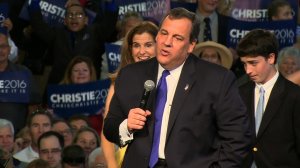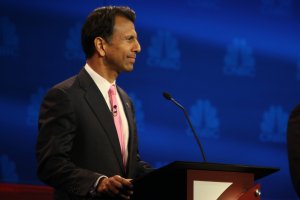The team of reporters, researchers and editors across CNN selected key statements and rated them: True; Mostly True; True, but Misleading; False; or It’s Complicated.

Jeb Bush
Reality Check: Jeb Bush on part-time work, workforce participation and poverty
Bush attacked President Barack Obama on three points about jobs and poverty under his tenure.
“They’re (Republicans) concerned that Washington is so dysfunctional, it is holding them back; there are lids on people’s aspirations. Six point five million people working part time. Workforce participation rates, lower than they were in 1977. Six million more people living in poverty than the day that Barack Obama got elected president.”
Here’s how his statistics stack up by each phrase:
“They’re concerned that Washington is so dysfunctional it is holding them back. There are lids on people’s aspirations. Think about it: six and a half million people working part-time.”
Bush is right that in June, there were 6.5 million part-time workers who want more hours. That’s compared to 4.4 million a decade ago.
It has since dropped to 6 million, as of September.
The higher number of part-time workers is a remnant of the Great Recession. The large spike occurred in the final months of former President George W. Bush’s time in office. The problem has actually abated somewhat during Obama’s tenure, falling from 8 million the day he took office.
Many of the part-time workers find the hours they’re seeking by working more than one job, though the percentage of workers who have multiple jobs has also declined in recent years.
VERDICT: True
Bush then said: “Workforce participation rates, lower than they were in 1977.”
When it comes to workforce participation, only 62.4% of Americans are employed or looking for a job, the lowest since 1977. This decline predated Obama.
Why is this happening? Part of it is that America’s workforce is aging and the Baby Boomers are retiring. It is also declining because women are leaving the workforce to care for their children and men are dropping out in large part because they can’t find positions that pay decently or they don’t have the education and skills to land employment. Finally, the U.S. has a sizable number of working-age folks out on disability with chronic health conditions.
VERDICT: True, but misleading
And finally, Bush said: “Six million more people living in poverty than the day that Barack Obama got elected president.”
On poverty, the increase Obama took office is actually larger that Bush said: The number of Americans in poverty has risen by 6.9 million to 46.7 million people last year. But the raw number doesn’t take into account the growth in the U.S. population. When Obama was elected, the share of people in poverty was 13.2%. The most recent numbers show the poverty rate as 14.8%, down from a high of 15.1% in 2010.
VERDICT: True

Carly Fiorina
Reality Check: Carly Fiorina on Obamacare crushing small businesses
Fiorina made the claim that “if you’re a small business owner today, you are being crushed. We have 400,000 small businesses forming every year in the country. How great is that? They are employing themselves and potentially employing others. The bad news is we have 470,000 going out of business every year. And why? They cite Obamacare.”
Fiorina appears to be citing Small Business Administration statistics on the number of small business “deaths” in 2011. This was at least four years before Obamacare’s mandate on employers took effect.
Obamacare does not apply to small businesses with fewer than 50 full-time employees. Employers with more than 100 workers had to provide affordable insurance to most of them starting this year. Companies with 50 to 100 staffers have until next year to comply.
The SBA defines small businesses as those with fewer than 500 workers. Certainly, some small businesses subject to health reform are straining to adhere to the rules. The National Federation of Independent Businesses is a strong critic of Obamacare, saying the mandate is hurting their members and not lowering their cost of providing health insurance.
But there’s no indication that Obamacare is costing jobs. Few employers subject to the mandate report changing their staffing or hiring because of Obamacare, according to the 2015 Kaiser Family Foundation/Health Research & Education Trust survey.
VERDICT: False

Ted Cruz
Reality Check: Ted Cruz on women’s wages
Attacking President Barack Obama’s economic record, Cruz cited statistics showing conditions worsening for women under Obama’s tenure, claiming Democrats running for president are avoiding the topic.
“Under Barack Obama, 3.7 million women have entered poverty. … Under Barack Obama and the big government economy, the median wage for women has dropped $733,” Cruz said.
A review of data from the Census department — which the Republican National Committee cites when circulating the exact same statistics — indicates that Cruz is utilizing figures from 2011 and 2012.
Cruz is right that between 2008 and 2012, 3.7 million women fell below the poverty line. He’s also correct that in 2011, the median income for women is $732 less than it was in 2008.
Even using updated figures, Cruz’s assertion that women’s income has fallen holds up. The median income for women in 2014 was still lower than it was in 2008.
Changes in Census methodology between 2008 and 2014 make it difficult to precisely pinpoint how much lower median incomes are, though the trend is clearly downward — roughly 3% lower than six years before.
Underlying Cruz’s claim is that Obama’s economic policies led to the drop in incomes, an assertion that’s difficult to back up given the financial crisis predated Obama’s inauguration.
But he’s accurate that based on the numbers, women’s median incomes are worse off than they were in 2008.
VERDICT: True

Ben Carson
Reality Check: Ben Carson on his flat tax rate
Carson insisted he didn’t say his tax rate would be 10%, saying he merely used tithing as an “analogy.” He said his rate would be “much closer to 15%.”
Earlier this month, Carson told Marketplace that he uses a 10% flat tax because it’s “easy to work with the numbers” and reiterated that it would be closer to 15.
But Carson has, at least once, put a more exact figure on his flat tax idea and it was close to 10%. Speaking in Aiken, South Carolina, in September, Carson said his personal income tax rate would “probably” be 11.5% along with a 4% value-added tax on nonessential goods.
“Just to clarify, I actually think it would be probably be a bit more than 10%. It’s probably going to be about 11.5 %. And it’s probably going to require a 4% — what would you call it? A value-added tax on non-essentials. That would keep us revenue neutral. We only need to be revenue neutral in the beginning because there’s a lot of waste that could be cut out of our system.”
VERDICT: False

Chris Christie
Reality Check: Chris Christie on entitlements and debt service
Christie said, “71% of federal spending today is on entitlements and debt service.”
The spending categories that constitute “entitlements” vary by source, but this seems largely accurate, using the budgets for the major entitlement programs and debt servicing costs from fiscal year 2015.
In August, the bipartisan non-profit Committee for a Responsible Federal Budget calculated that 68% of total spending in 2015 went to “mandatory and interest spending.” The group noted that by the time the next president takes office in 2017, those categories are expected to reach 71% of the total federal budget.
Calculated a different way, the Bipartisan Policy Center estimates that discretionary spending amounts to about 31-32% of the total federal budget. The remaining 68-69% can be attributed to entitlements and debt service.
VERDICT: True
Chris Christie on Hillary Clinton wanting to raise Social Security taxes
Christie said Clinton wants to raise Social Security taxes.
“Here’s the difference between me and Hillary Clinton,” Christie said. “What Hillary Clinton is going to say and has said before is she wants to raise Social Security taxes.”
Clinton has said that the U.S. needs to look at raising the Social Security tax cap on people who make more than $250,000 per year — but she has not formally proposed doing so.
On August 11, Clinton was asked at a Claremont, New Hampshire, town hall meeting about the Social Security tax cap — the fact that Americans do not pay Social Security taxes on anything they earn above a certain amount. That limit is $118,500 this year.
“I can understand why you’d think that was unfair,” Clinton said. “We do have to look at the cap, and we have to figure out whether we raise it or whether we raise it a little and then jump over and raise it more higher up.”
Although Clinton has left the clear impression she is supportive of raising the tax, she has not formerly proposed raising it, as Christie suggests.
VERDICT: True, but misleading

Donald Trump
Reality Check: Donald Trump questions John Kasich’s economic record
The Ohio governor touted his economic record, primarily that he created 347,000 jobs as governor and moved the budget from a deficit to a surplus. But Trump quickly hit back on Kasich’s claims: “He hit oil, he got lucky with fracking. That is why Ohio is doing really well.”
Fracking first took off in Ohio four years ago. Since then, it has attracted more than $22 billion in investments to the state, and the industry estimated that it would create 200,000 jobs. However, independent analysts concluded that job growth has not been nearly as robust as first predicted.
IHS Global Insight, an economic analysis company, attributed the improving economy in Ohio to the fact that the manufacturing industry was expanding and that the population was growing slowly. They determined that the auto and plastics industries were the main drivers of growth — not fracking.
VERDICT: False
Reality Check: Donald Trump denies saying Marco Rubio was Mark Zuckerberg’s ‘personal senator’
In a question about the nation’s immigration laws, and specifically H-1B visa policy, Trump was pressed about whether he ever referred to Rubio as Facebook founder Mark Zuckerberg’s “personal senator” because of their stance over those visas. “I never said that, I never said that,” Trump told CNBC moderator Becky Quick. “Somebody’s really doing some bad fact-checking.” Trump was pressed on it again moments later and repeated his assertion.
It turns out that is exactly what it says on his campaign website in a section about immigration reform proposals:
“Raising the prevailing wage paid to H-1Bs will force companies to give these coveted entry-level jobs to the existing domestic pool of unemployed native and immigrant workers in the U.S., instead of flying in cheaper workers from overseas. This will improve the number of black, Hispanic and female workers in Silicon Valley who have been passed over in favor of the H-1B program. Mark Zuckerberg’s personal Senator, Marco Rubio, has a bill to triple H-1Bs that would decimate women and minorities.”
VERDICT: False
Reality Check: Donald Trump on filing for bankruptcy
Trump said, “I never filed for bankruptcy, but many, many people did. What happened with Atlantic City is very, very disgraceful. Hundreds of companies I have opened, I have used it three times, maybe four times, came out great.”
The CNN Reality Check team looked at this during the September GOP debate. Here’s what he said then:
“I never went bankrupt by the way, as you know. Everybody knows. Out of hundreds of companies, hundreds of deals, I’ve used the law four times. Made a tremendous thing. I’m in business. I did a very good job. But I will say this: People are very, very impressed with what I’ve done, the business people.”
Trump has never filed for personal bankruptcy. But he has filed four business bankruptcies, which Bankruptcy.com says makes Trump the top filer in recent decades. All of them were centered on casinos he used to own in Atlantic City. They were all Chapter 11 restructurings, which lets a company stay in business while shedding debt it owes to banks, employees and suppliers.
VERDICT: True, but misleading

Marco Rubio
Reality Check: Marco Rubio on missed votes
Marco Rubio, defending himself against accusations he’s been overly absent from the Senate as he runs for president, cited previous lawmakers running for president who also missed votes while out on the campaign trail.
“This is another example of the double standard that exists in this country between the mainstream media and the conservative movement,” he said.
He cited three former Democratic senators who ran for their party’s nomination — Bob Graham of Florida and John Kerry of Massachusetts in 2004, and Barack Obama of Illinois on 2008 — that he said also missed large percentages of votes as they campaigned.
Checks of his figures indicate Rubio is correct.
Rubio has missed 34% of his votes in the Senate so far this year, according to GovTrack.
Graham missed 32% of votes in 2003, the year he declared his candidacy. That rate spiked to more than 70% in the late summer, as the race heated up.
Kerry’s absentee rate was even higher — 64% in 2003, and close to 90% in 2004, spiking after he had secured the Democratic nomination.
Then-Sen. Obama missed 26% of his votes in 2007 and 64% in 2008, and skipped almost all of the votes in the months directly leading up to the election.
But unlike those men, Rubio has said he’s finished with his Senate career, whether he wins the presidency or not. That fact has led to calls for his resignation now, including Wednesday night from Jeb Bush, a Florida resident.
Ultimately, however, Rubio’s defense that uses historic data is true.
VERDICT: True

Lindsey Graham
Reality Check: Lindsey Graham on Social Security and poverty
“Social Security is not just a concept to me,” Graham said at the undercard debate. “I know why it exists. Fifty percent of today’s seniors would be in poverty without a Social Security check. I promise you, if you make me your president, I will save Social Security because I know why it exists.”
Without Social Security benefits, 50% of seniors would have been in poverty in 2014, according to the Census Bureau.
VERDICT: True

Bobby Jindal
Reality Check: Bobby Jindal on cutting the Louisiana state budget
“What we did is cut (Louisiana) state spending. We cut our budget 26% … We have 30,000 fewer state employees than the day I took office,” Louisiana Gov. Bobby Jindal said at the undercard debate.
Jindal says he cut the budget by 26%, but the New Orleans Times-Picayune wrote in 2011 that much of the decline was due to the petering out of federal recovery funds in the aftermath of Hurricanes Katrina and Rita and the end of President Barack Obama’s federal stimulus funding.
It’s true he cut the number of state employees by 30,000. The state government payroll now stands at just under 85,000, down from just over 114,000, according to federal data.
But what Jindal didn’t say is that his state has suffered from financial shortfalls for years, in part because of the economic downturn and in part because of the governor’s refusal to raise taxes. Falling oil prices have also wreaked havoc. He and state legislators had to wrestle with a massive budget gap of $1.6 billion earlier this year.
VERDICT: True, but misleading
George Pataki
Reality Check: George Pataki says Hillary Clinton’s private email server was hacked and state secrets were stolen
“We have no doubt that (Hillary Clinton’s server) was hacked and that state secrets are throughout to the Iranians, the Russians, the Chinese and others,” former New York Gov. George Pataki said.
Clinton has said it was a “mistake” to use a private email server in her home during her tenure as secretary of state and has apologized for the confusion it has caused. She and her aides have also asserted that there was no classified information stored or sent on the server.
Since the discovery of the arrangement, the Justice Department is now looking into how the information on Clinton’s server was handled, and Clinton’s aides have turned the server over to the FBI as part of that probe.
The intelligence community and State Department inspectors general also revealed in July that some of Clinton’s emails contained classified information that was not identified correctly, but State Department officials maintain the information was not classified at the time it was sent.
But as to whether the server itself was breached by a foreign government and its contents accessed, there were reports in August that Russian hackers tried to break into her server five times. However, reporting by CNN to date has shown that five emails sent to her under the subject line of “Uniform Traffic Ticket” were part of a widespread phishing effort dating back to 2011 that was prevalent and that New York State Police had flagged for people to be aware of. While the presence of the emails shows there was a risk of vulnerability to Clinton, there is no evidence she ever fell for the hoax. There is also no evidence the scam was specifically directed at Clinton.
And there has been no indication to date of any Iranian, Chinese or other entities penetration of the server.
VERDICT: False
Reality Check: George Pataki on Obama’s military budget veto
“Barack Obama is the first president in American history to hold our military hostage,” former New York Gov. George Pataki said at the undercard debate, going on to suggest that Obama’s recent veto of the National Defense Authorization Act was the first time a U.S. president had held up military funding.
Pataki was referring to last week when Obama rejected the bill over a disagreement with Congress — issuing a veto in public for the first time in his presidency — because of the way it circumvented mandatory spending cuts and impeded his efforts to close the Guantanamo Bay naval prison.
But at least four of Obama’s predecessors vetoed annual Defense Authorization Acts:
— President Jimmy Carter objected to the bill in 1979 because it funded a $1 billion nuclear-powered aircraft carrier.
— President Ronald Reagan sent the 1988 NDAA back to Congress since it shrank U.S. missile defense programs.
— Missile defense programs were again the problem in 1996, when President Bill Clinton turned down the NDAA since he believed a new defense system violated international law.
— And in 2007, President George W. Bush vetoed an NDAA since it could have frozen Iraqi assets that were held in U.S. banks – holding up military funding as two U.S.-led wars were raging in Iraq and Afghanistan.
Ultimately, Obama’s veto of the NDAA will likely have little effect on the Pentagon’s operations. If the budget agreement currently making its way through Congress passes, as is expected, caps on military spending will increase by $25 billion for the next two years.
Pataki’s suggestion that Obama is the first commander-in-chief to hold up defense funding over disagreements in Congress doesn’t match up with history.
VERDICT: False




